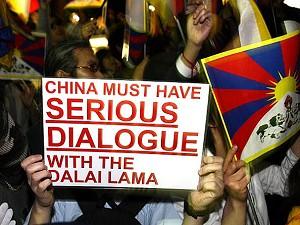On May 4, representatives of the Dalai Lama, Tibet’s exiled spiritual leader, met with officials of the Chinese Communist Party (CCP) at the Kylin Villa in Shenzhen City, Guangdong Province. This is the first meeting between the two sides since the surge of demonstrations and retaliatory crackdown in Lhasa this March.
Hong Kong China News Agency quoted from an authoritative source in Beijing that despite the one-day talks being a good first step, Beijing continues to assert that the measures it had taken over the Lhasa riots on March 14 were legal.
According to a Hong Kong media report, the meeting included representatives from the Tibet government in exile: Lodi Gyari, based in Washington, and Kelsang Gyaltsen, based in Geneva. The CCP side were represented by two ministers, Zhu Weiqun and Sitar (Tibetan) of the United Front Work Department.
The Hong Kong China News Agency stated that though views from the two sides differ, the atmosphere of the talks was good. However, the official involved in the parleys continued to justify the authorities’ actions. “The policy that the central authorities had adopted and the measures they had taken regarding the March 14 violent incident, were all in accordance with the law and were completely correct. They have gained wide support from all Chinese people including the Tibetans,” he said.
Before the talks, in front of 16 Japanese news agencies, Hu Jintao voiced hope that the talk with the Tibetan representatives would bring a positive outcome. But, Hu demanded the Dalai Lama “stop splitting China, stop plotting and inciting violence, and stop disrupting and sabotaging the Beijing Olympic Games to create conditions for further talks.”
Renowned Tibetan specialist Wang Lixiong said to the Hong Kong Apple Daily on May 4 that if Beijing continues this public relations strategy which sees reopening negotiations with the Dalai Lama as a necessary formality to ease international criticism, it will likely trigger even greater recoil from Tibetans, who support the Dalai Lama. “The consequences will be hard to imagine,” said Wang. “Both Beijing and the Dalai Lama should be clear on this point.”
Wang indicated that one of the catalysts for this recent incident in Tibet occurred when the Dalai Lama stated on March 10 that no concrete results came from the previous six talks he had with Beijing. These words sparked once hopeful Tibetans living in mainland China to jump from disappointment to despair.
The Voice of Tibet in Norway quoted from Tibetans inside mainland China saying that Tibetans in China do not hold any hope for this dialogue. They believe that the CCP wants to use the Dalai Lama to quell the current Tibetan uprising, as well as the many social problems in China and the increasing international pressure on the Beijing Olympics. They believe this round of “contact and consultation” is what the CCP needs to assure Western countries that China is working toward a solution.
The Tibetan Parliament member of the government-in-exile Khedroob Thondup indicated to the Ming Pao Daily that while the CCP and the Tibetan sides had been in contact many times, the pattern remains the same. “It is hard to see what good results can come out of this dialogue,” Khedroob Thondup said. “In the previous meetings, [we] have always been seen by CCP officials as the target for political education.”
Since the bloody suppression of the Lhasa demonstrations on March 14, international media and Western politicians have repeatedly urged Beijing to reopen the talks with the Dalai Lama. In order to ease international pressure and avoid affecting the Olympics, Beijing declared on April 25 that it would meet privately with representatives of the Dalai Lama. Yet even as Beijing made this declaration, the CCP continued its constant attack on the Dalai Lama through its state-controlled media.





